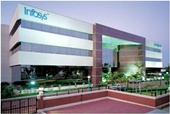 On June 25, India's second-largest information technology services provider, Infosys, announced that its co-chairman, Nandan Nilekani, had quit to head the government's Unique Identity (UID) project. The senior management, including Narayana Murthy, Kris Gopalakrishnan and Mohandas Pai, stepped in quickly to convince employees and investors that the new leadership had enough steam to steer brand Infosys to greater heights.
On June 25, India's second-largest information technology services provider, Infosys, announced that its co-chairman, Nandan Nilekani, had quit to head the government's Unique Identity (UID) project. The senior management, including Narayana Murthy, Kris Gopalakrishnan and Mohandas Pai, stepped in quickly to convince employees and investors that the new leadership had enough steam to steer brand Infosys to greater heights.
Then, in late October, the company announced that the founder, chairman and chief mentor, Narayana Murthy, was selling shares to start his own venture fund. Murthy told this was "to help me, once I retire from Infosys in 2011".
Then, Infosys BPO's Chief Executive Officer and Managing Director, Amitabh Chaudhry, quit last month. He was a high-profile senior executive, tipped at one time as one of the probables to occupy the top seat in Infosys Technologies after current CEO & MD, Kris Gopalakrishnan. He has chosen to join HDFC Standard Life Insurance instead, given his financial background. And even as Infosys started looking for a successor to replace him, Joydeep Mukherjee-- who headed the company's knowledge process outsourcing (KPO) division-- put in his papers.
Human Resources consultants and industry analysts who closely track the company say around 110 people, including 20 senior consultants and at least six Vice-Presidents have quit Infosys in the past six months. "These are people who had been with the company for the past 10-15 years," say HR sources.
Infosys, however, begs to differ. It maintains 'only' 12 senior executives quit during the past two years, "not to join other companies, but to pursue education, work for NGOs or start their own business ventures". "These were star performers at some point and after some time, they didn't grow. But that is the way it is... you can't make everybody a vice-president or a senior VP. And, some of them feel the pain," acknowledges Nandita Gurjar, senior VP and Group Head, HR, for Infosys.
Some senior executives who quit in the recent past were with Infosys during its formative years when the company was a toddler trying to make its presence felt in global markets. For instance, Mukherjee, who headed the KPO practice, was with Infosys for 18 years. For many others, Infosys was the first job.
"As the company grows in size, a lot of processes have to be revamped. Things cannot be the same when you are a $100-million company, and then shoot up to $500 million and then grow to reach close to $5 billion," explains a senior Infy executive who put in his papers recently. Others say they missed the old days when Infosys was like a close-knit family. "There was a time when we used to get a lot of personal attention from all, including Murthy and Nilekani. We often sat together, discussing about not just issues but also issues related to us," recalls another ex-employee.
Infosys now employs over 105,000 people. Gurjar says attrition in senior management is less than five per cent, less than half the overall rate. "And, in many cases, senior management people decide to leave to either start their own venture or work with some NGO. They rarely leave to join a rival company. Once Infoscions, they are always Infoscions," she says.
"Management changes can be a reflection of the company reaching a stage in the maturity life cycle. This principle applies at a broader level and can be traced to other firms in the IT and BPO industry," says Amneet Singh, VP Research, Everest Group.
Infosys was founded by techies who were purely first-generation entrepreneurs. They did not allow family members of the co-founders to enter the company, and ran it professionally. However, the unwritten practice has been to make all the co-founders CEOs by rotation. There would be other board members and senior executives who vie for the post.
A HR consultant, for instance, who recently met two senior executives (rank of VPs) from Infosys, says most of those quitting the company believe it is not willing to shed a conservative way of thinking and to instill fresh blood at senior levels. "The company does not know where it is going, and is running on the old glory. Top people (senior management) in the company are not willing to understand the market dynamics has changed and they need to adapt," he adds.
Kris Gopalakrishnan counters the company embarked on leadership development in a formal way long before. "We have a leadership development process and we have several leaders who have been identified. They have been trained, mentored by the current set of leaders, through the leadership development programme. We have also launched a move to decentralise a lot of functions to the next generation of leaders."
The company says that on average, an employee is with the company for at least 4.5 to five years. The number has gone up now, claims Gurjar. But not so with Infosys BPO, now a fully-owned subsidiary after Infosys bought out Citigroup's 23 per cent stake for $115.1 million (Rs 518 crore) in 2006. The last two CEOs of Infosys BPO did not stay for more than three years. Industry analysts say the problem of senior executives quitting might be because of the decision to make BPO a subsidiary by buying out Citi, instead of 'taking it public', much discussed at that point. Many of them expected to benefit in the event of Infosys taking the BPO (then Progeon) for a public issue.
Gopalakrishnan, however, counters that the company made the point clear then, on integrating the BPO with Infosys to provide integrated services to clients. "When Citi was owning a stake in BPO, the exit option through an IPO was there. We took it (stake) over because we felt the option is no longer necessary. It was more important for us to give a complete end-to-end service to our clients, all the way from consulting to operations, within the same company."










